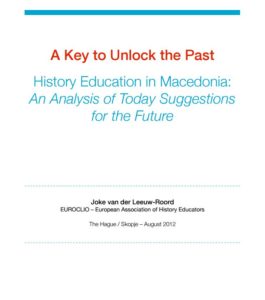The violent conflicts of the (recent) past still hold much weight in inter-ethnic relations in Macedonia and the countries that make up Former Yugoslavia. In education, these issues nowhere more apparent than in any subject more than history, where narratives of the conflicts and sensitive issues in Macedonia’s past are either exclusively-ethnically driven, or simply ignored by educators who do not have the educational tools and methodology to effectively teach about them.
This project aimed to support the multi-ethnic professional working team of the History Teachers Association of Macedonia empowering them as agents of change in promoting peace and social cohesion through history education in a divided society. Educators were trained by regional experts in addressing sensitive issues in history, in the classrooms of Macedonia. The participation of professionals reflected the ethnic diversity of the country, meaning educators from all backgrounds were trained. Using HTAM as an active civil society organization in education, through the multiplier effect the history educators transferred their skills and competencies to both educators and students alike.
The project targeted a civil society of a younger generation of historians, history and civics educators in higher and secondary levels, curriculum developers, textbook authors, policy makers, historians and experts in the field of history and civic education and students as lasting agents of change in the Republic of Macedonia. The project used a tried-and-tested methodology that deals with sensitive issues through a best-practice approach to peace-building through history education.
Project Aims
[su_list icon=”icon: caret-right”]
- Strengthening of a multi-ethnic, multi-religious civil society organization of history educators.
- Improved professional capacities of history educators to deal with sensitive issues.
- To improve the skills, lobby and networks of history educators.
Results
[su_list icon=”icon: caret-right”]
- Involvement of over 100 history educators from Macedonia and the Western Balkans from multi-ethnic and multi-religious backgrounds.
- Improved professional capacities of at least 60 history educators in dealing with sensitive issues.
- Improved lobby and network skills of history educators, and comprehensive analyses and recommendations of current curriculum, disseminated to relevant stakeholders.
Publications
This independent inquiry has looked into the current history curricula, current history textbooks, class room practice, teacher preparation and in-service teacher training. In this study I have tried to address key stakeholders such as the advisors within the Ministry of Education and the Bureau of Educational Development, Academic Historians, State Education Inspectorate, the National Agency for textbooks but primarily current trainers and teachers. The research also looked at documents and appropriate literature. As a result a set of suggestions for improvement related to the research areas are made. I hope that this publication supports professional thinking on how to further the development of innovative and responsible history education in the Republic of Macedonia.
Governmental and non-governmental partners
Project Managers
Joke van der Leeuw-Roord, EuroClio Executive Director
Jonathan Even-Zohar, EuroClio Director (former Project Manager)
Contributors
Besnik Emini, Mire Mladenovski, Mare Oja, Ritta Mikkola, Katerina Brentanou, Semih Aktekin, Emina Živković, Fetnan Dervish, Ineke Veldhuis – Meeste, Geert Kessels, Irina Kostyuk, Neil Mc Lennan, Mirjam Zeilmaker, Thomas Micheal Baier, Dennis Dretling, Dzintra Liepina, Iryna Kostyuk, Ivana Dobrivojevic, Jacek Staniszewki, Jakub Lorenc, Michael Maddison.




